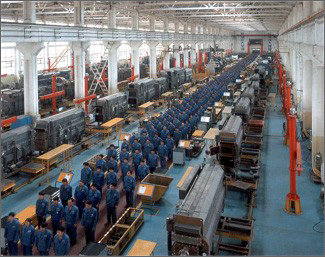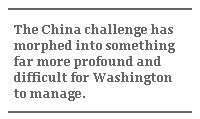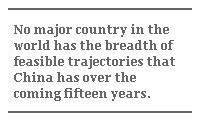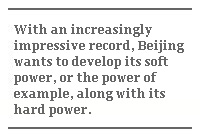Why the US Malaise Over China?
Why the US Malaise Over China?

ANN ARBOR: Beijing officially insists that it will pursue peaceful development for decades to come in order to meet its high-priority domestic needs. The conclusion is that others have no objective basis to regard China's development as a threat. This posture likely reflects the views of the country's top leaders today.
Despite the development of a wide-ranging, complex, and mature US-China relationship, there is, nevertheless, pervasive unease in the United States today about China's impact on American vital interests. This sense of malaise about China reflects the reality that the PRC's remarkable recent record of development has understandably increased American sensitivities and worries over five fundamental issues. Even assuming China will not engage in future aggression, these issues will influence future US-China relations.

Issue #1: China is no longer simply a foreign policy issue for the US. America for decades treated China as a diplomatic and security issue, seeking its constructive participation in multilateral economic, political, and other regimes. In the process, the US has often given advice to China about the domestic reforms necessary to achieve success.
But now America itself must make serious and divisive domestic changes to remain highly competitive in a world where China is becoming a global manufacturing center. The issues involved - such as education, wages, and pensions - are so wide ranging that they effectively require reconsideration of major parts of America's domestic social contract. By becoming intertwined with core domestic changes requiring highly contentious decisions at home, the China challenge has morphed into something far more profound and difficult for Washington to manage. China's very success in its development effort, moreover, further adds to the difficulty of treating these issues in a calm, objective fashion.
Issue #2: There is disagreement in the US about the long-term nature of the US-China relationship. This disagreement pits those who see China by about 2020 as an inevitable enemy against those who see China by 2020 as merely a potential enemy. The former suggest that the die is already cast and therefore the US should do what it can to constrain the speed and reduce the efficacy of China's efforts to achieve wealth and power. The latter contend that astute diplomacy, along with a little bit of luck, can increase the prospect of relatively constructive long-term relations that benefit both sides in seeking international stability, economic vibrancy, effective multilateral efforts to address environmental, public health, criminal, proliferation, and other issues.

The latter group, though, cannot be certain enough of success to ignore strategies for hedging against a less desirable future. Moreover, the same debate takes place in Beijing as in Washington, and the "inevitable enemy" groups in both capitals advocate policies that could easily become self-fulfilling prophecies.
This underlying disagreement about the long-term future increases the concern about each of the following three issues.
Issue #3: It is not clear just where China is headed domestically. For good reason Americans are confused about China's future domestic trajectory. Some see a leviathan in the making that will perforce become a new global center of soft and hard power. Others see successful economic growth seriously impacting the global environment and prices for primary products. And still others fear a catastrophic collapse that will produce highly destabilizing refugee flows, proliferation dangers, enhanced opportunities for international criminal syndicates, and other problems.

China's future political system is also unclear. Will it produce a marriage between big business leaders and autocratic officials who use nationalism and coercion to keep the poor in line? Will it follow the paths of others in Asia toward the gradual development of first a dominant one-party democracy and then a more truly competitive political system? Or will it become a weak and corrupt authoritarian polity?
Although these alternatives do not exhaust the realistic possibilities, they highlight why various Americans who debate our future with China bring into play a range of potential descriptions. Greater confidence in the PRC's trajectory would permit a more focused and pragmatic debate in the US. But no major country in the world has the breadth of feasible trajectories that China has over the coming fifteen years.
Issue #4: America and China are uncertain about their future respective roles in Asia. After 9.11 the Bush administration focused its attention on what it termed the global war on terror (GWOT) and invaded both Afghanistan and Iraq. Throughout the remainder of his first term, President Bush treated multilateral diplomacy in Asia largely as an adjunct to the GWOT, and counterterrorism became the leitmotif of virtually all his major personal diplomacy in the region. During these same years China, by contrast, vastly expanded the scope and increased the sophistication of its multilateral regional diplomatic efforts, especially in Southeast Asia. By 2004 there was a palpable sense of Chinese dynamism and American unilateralism and neglect.
During this same period of time, China replaced America as the largest foreign trade partner for most countries in the region. Indeed, 2001 to 2004 witnessed the full emergence of a regionally integrated Asian manufacturing system, with China serving primarily as the point of final assembly for parts and components produced throughout the area for export to North America and the EU.

Over the past year the Bush administration has become sensitive to this issue. But to the extent that it frames the issue as the need to counter China's activities in the region, US-China tensions and mutual suspicions will grow.
Issue #5: The US and China exemplify different global development models. As China's record appears increasingly impressive, Beijing wants to develop its soft power, or the power of example, along with its hard power. America has since the early 1990s touted the "Washington Consensus," a model that posits open economies and financial systems and is premised on the superiority of democratic politics. China's distinctive development model, by contrast, is being dubbed the "Beijing consensus," which posits far more state intervention in the economy and a greater concern with political stability and strong government to guide the development process. To the extent that Washington sees Beijing as supporting an alternative path to development, suspicions of China's intentions and potential impact will grow.
None of these five issues posits that between now and 2020 US-China relations cannot be peaceful. But each of them highlights why even peaceful relations can be fraught with tensions and fears, made all the worse by the ongoing speed of China's development.
Adding to the difficulty is that there are no sure answers to these issues. All involve complex contingencies whose outcomes nobody can specify with certitude. Managing US-China relations to maximize the opportunities for win-win outcomes, even as China seeks peaceful development, will require that leaders on both sides have not only the wisdom to understand the issues, but also the political skill and courage to keep them from getting out of hand.
Kenneth Lieberthal is Professor of Political Science, William Davidson Professor of Business Administration, and Professor of Corporate Strategy at the University of Michigan. He served for 1998-2000 as Special Assistant to the President for National Security Affairs and Senior Director for Asia on the National Security Council.